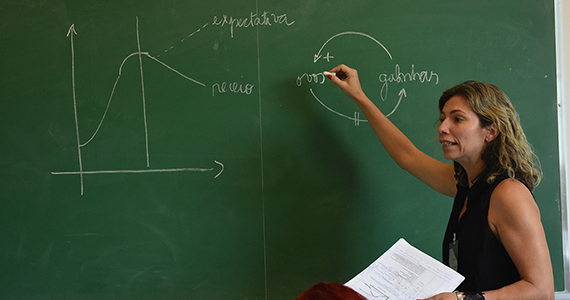Salud Urbana en América Latina (SALURBAL) Project Holds Workshop with Brazilian Food and Transportation Experts in São Paulo
The event was the project's second in a series of systems group modeling building workshops
April 3, 2018
By Adriana Lein
The Brazilian hub of the Salud Urbana en América Latina (SALURBAL) project recently held a one-and-a-half-day group model building workshop with twelve transportation and twelve food systems experts from March 20-21. The workshop took place under SALURBAL’s systems group, an aim of the project dedicated to using systems methods and modeling techniques to map dynamic and complex relationships involved in the many levels of a city’s organization. Systems methods, applied to urban health, are promising tools to evaluate the impact of policies and interventions, as well as to identify the range of potential changes in both the short-term and long-term.
Workshop participants hailed from a variety backgrounds, spanning policy and government, civil society, the private sector, and scientific communities. Institutions represented included the Pan American Health Organization, the Inter-American Development Bank, the Brazilian Ministry of Health, a cycling advocacy group, an urban farm, and various Brazilian universities. The University of São Paulo, one of SALURBAL’s partner institutions, hosted the workshop. On the first day, SALURBAL project members from the host institution, the Federal University of Minas Gerais, and the Oswaldo Cruz Foundation (FIOCRUZ), provided workshop participants with an introduction to Systems methods and the causal loop models that they would create over the course of the workshop. After breakout and small group sessions divided into transport and food experts, participants were mixed to develop combined models.
The participatory nature of the workshop challenged attendees to think outside of their areas of expertise and consider how transportation and food sectors are related and can jointly impact health outcomes. For example, as noted in workshop exercises, a city’s transportation system might affect urban land use, which in turn can influence local agriculture production and residents’ healthy food options, influencing rates of chronic diseases. The diversity of participants was instrumental to the success of the workshop; the opportunity to collaborate with others from different fields sparked interesting discussions and new ways to approach issues. On the last day, the entire group reconvened to brainstorm policies and interventions.
The systems workshop play an important role in SALURBAL’s policy outreach and evaluation activities. One of the most valuable contributions of the workshop is the identification of policy actions that could be used to inform changes to urban agendas and design. Another key feature of the workshop was its focus on interdisciplinary and cross-sectoral collaboration to solve urban health challenges. By involving stakeholders in project activities, SALURBAL is working to strengthen links between scientific evidence and policy practice.
Since April 2017, SALURBAL has been working to examine the impacts of urban environments and policies on health in cities throughout Latin America. The group model building workshop was the second in a series of the project. The first workshop was held in Lima, Peru in November 2017 and the final workshop will take place in Antigua, Guatemala in May 2018. Together, the ideas and outputs from the workshop will shared in broader project dissemination and will also inform the structure of systems simulation models in upcoming project years. The workshops are one of the many ways that the SALURBAL project is engaging with stakeholders beyond traditional scientific communities to translate findings into actionable knowledge to support healthier urban environments.
